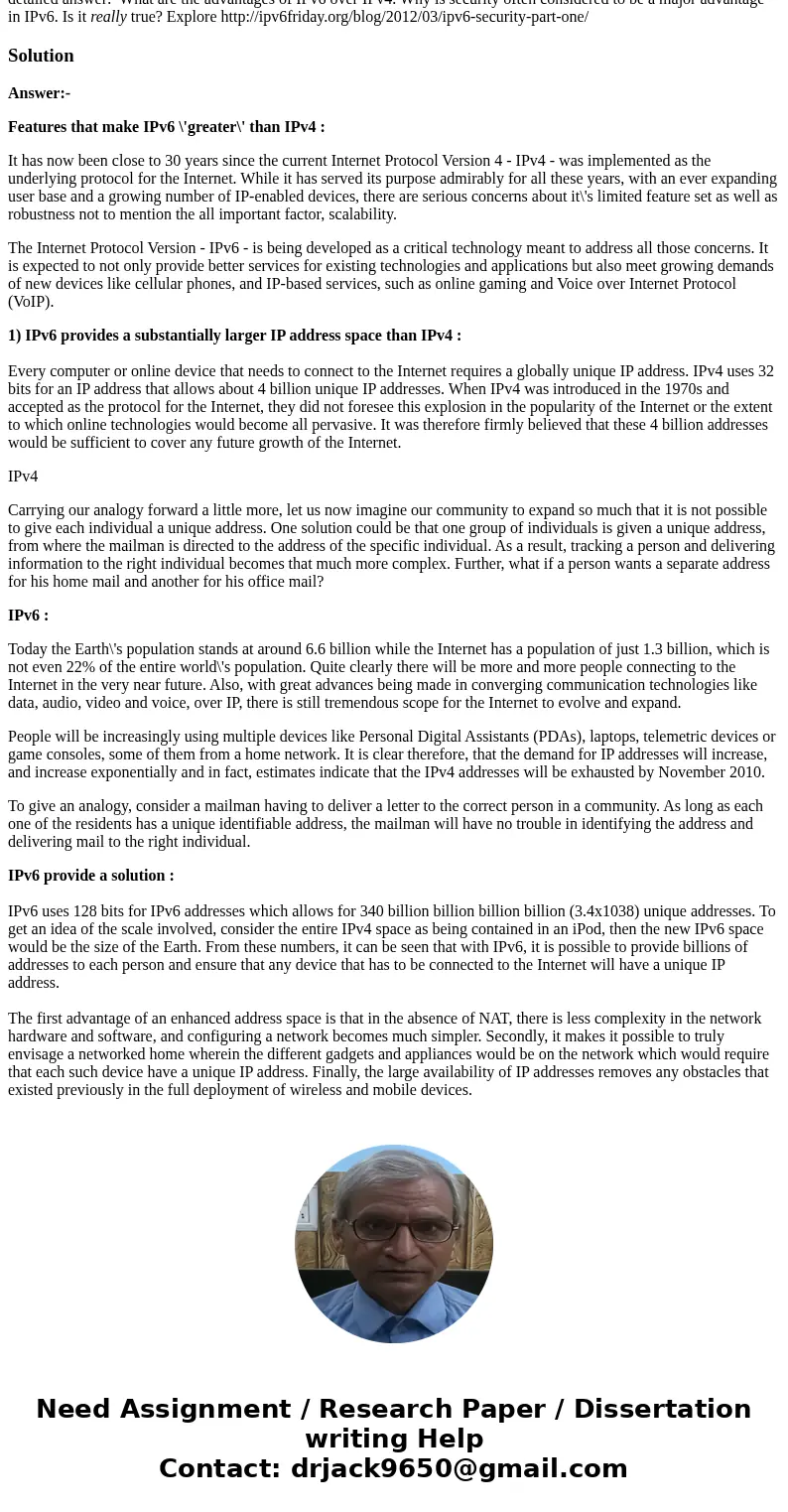detailed answer What are the advantages of IPv6 over IPv4 Wh
detailed answer: What are the advantages of IPv6 over IPv4. Why is security often considered to be a major advantage in IPv6. Is it really true? Explore http://ipv6friday.org/blog/2012/03/ipv6-security-part-one/
Solution
Answer:-
Features that make IPv6 \'greater\' than IPv4 :
It has now been close to 30 years since the current Internet Protocol Version 4 - IPv4 - was implemented as the underlying protocol for the Internet. While it has served its purpose admirably for all these years, with an ever expanding user base and a growing number of IP-enabled devices, there are serious concerns about it\'s limited feature set as well as robustness not to mention the all important factor, scalability.
The Internet Protocol Version - IPv6 - is being developed as a critical technology meant to address all those concerns. It is expected to not only provide better services for existing technologies and applications but also meet growing demands of new devices like cellular phones, and IP-based services, such as online gaming and Voice over Internet Protocol (VoIP).
1) IPv6 provides a substantially larger IP address space than IPv4 :
Every computer or online device that needs to connect to the Internet requires a globally unique IP address. IPv4 uses 32 bits for an IP address that allows about 4 billion unique IP addresses. When IPv4 was introduced in the 1970s and accepted as the protocol for the Internet, they did not foresee this explosion in the popularity of the Internet or the extent to which online technologies would become all pervasive. It was therefore firmly believed that these 4 billion addresses would be sufficient to cover any future growth of the Internet.
IPv4
Carrying our analogy forward a little more, let us now imagine our community to expand so much that it is not possible to give each individual a unique address. One solution could be that one group of individuals is given a unique address, from where the mailman is directed to the address of the specific individual. As a result, tracking a person and delivering information to the right individual becomes that much more complex. Further, what if a person wants a separate address for his home mail and another for his office mail?
IPv6 :
Today the Earth\'s population stands at around 6.6 billion while the Internet has a population of just 1.3 billion, which is not even 22% of the entire world\'s population. Quite clearly there will be more and more people connecting to the Internet in the very near future. Also, with great advances being made in converging communication technologies like data, audio, video and voice, over IP, there is still tremendous scope for the Internet to evolve and expand.
People will be increasingly using multiple devices like Personal Digital Assistants (PDAs), laptops, telemetric devices or game consoles, some of them from a home network. It is clear therefore, that the demand for IP addresses will increase, and increase exponentially and in fact, estimates indicate that the IPv4 addresses will be exhausted by November 2010.
To give an analogy, consider a mailman having to deliver a letter to the correct person in a community. As long as each one of the residents has a unique identifiable address, the mailman will have no trouble in identifying the address and delivering mail to the right individual.
IPv6 provide a solution :
IPv6 uses 128 bits for IPv6 addresses which allows for 340 billion billion billion billion (3.4x1038) unique addresses. To get an idea of the scale involved, consider the entire IPv4 space as being contained in an iPod, then the new IPv6 space would be the size of the Earth. From these numbers, it can be seen that with IPv6, it is possible to provide billions of addresses to each person and ensure that any device that has to be connected to the Internet will have a unique IP address.
The first advantage of an enhanced address space is that in the absence of NAT, there is less complexity in the network hardware and software, and configuring a network becomes much simpler. Secondly, it makes it possible to truly envisage a networked home wherein the different gadgets and appliances would be on the network which would require that each such device have a unique IP address. Finally, the large availability of IP addresses removes any obstacles that existed previously in the full deployment of wireless and mobile devices.


 Homework Sourse
Homework Sourse